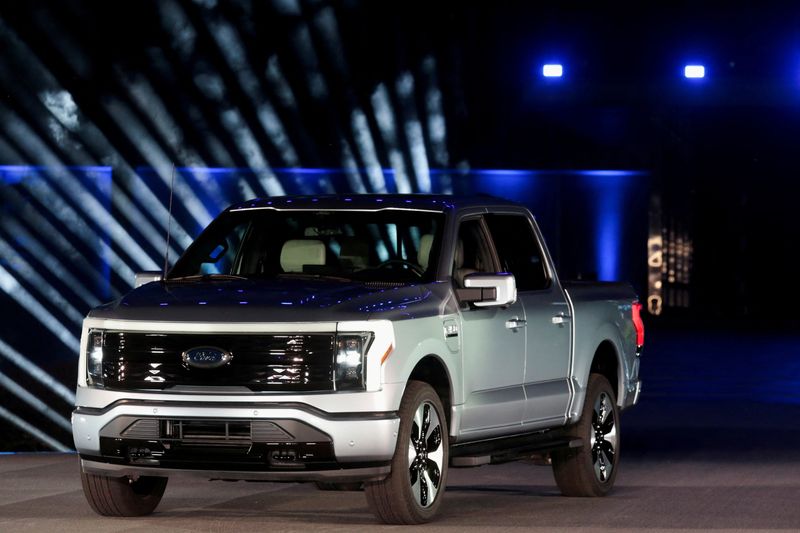By Joseph White
DETROIT (Reuters) - The past year was sobering for investors who poured money into Tesla (NASDAQ:TSLA) Inc and rival electric vehicle startups that hoped to emulate Tesla CEO Elon Musk's success.
As interest rates rose and financial markets gyrated, shares in many EV startups deflated. Rivian Automotive Inc, which had a higher market value than Ford Motor (NYSE:F) Co shortly after it went public in 2021, lost more than 70% of its value over the past year.
Other EV startups fared worse. Electric van maker Arrival warned it could run out of cash in less than a year. Lucid Group Inc, backed by Saudi Arabia's sovereign wealth fund, struggled to build its sleek Air luxury EVs. Chinese Tesla challenger Xpeng (NYSE:XPEV) Inc's shares lost more than 80% of their value.
Now comes the hard part: Persauding more mainstream consumers to come along for the ride.
WHY IT MATTERS
The automobile industry is pouring more than $1 trillion into a revolutionary shift from combustion engines to electric vehicles guided by software. From Detroit to Shanghai, automakers and government policymakers have embraced the promise of electric vehicles to provide cleaner, safer transportation. European countries and California have set 2035 as the deadline for ending sales of new combustion passenger vehicles.
Tesla Inc's surge to become the world's most valuable automaker - achieving a $1 trillion valuation last year - humbled established automakers such as Toyota Motor (NYSE:TM) Corp and Volkswagen AG (OTC:VWAGY) that once were reluctant to go electric.
Starting next year, a wave of new electric vehicles from pickup trucks to middle market SUVs and sedans will hit the world's major markets.
Industry executives and forecasters do not agree on how rapidly electric vehicles could take over half the global vehicle market, let alone all of it.
In China, the world's largest single automotive market, battery electric vehicles have captured about 21% of the market. In Europe, EVs account for about 12% of total passenger vehicle sales. But in the United States, EV market share is only about 6%.
Among the barriers to EV adoption, industry executives and analysts said, were a dearth of public fast-charging infrastructure, and the rising cost of EV batteries, driven by shortages of key materials and uncertainty over government subsidies that have buoyed EV purchases in major markets including the United States, China and Europe.
By 2029, electric vehicles could account for a third of the North American market, and about 26% of vehicles produced worldwide, according to AutoForecast Solutions, a consultancy.
Electric vehicle sales likely will not increase in a smooth, ever-ascending curve, said AFS President Joe McCabe. If there is a recession next year, as many economists forecast, that will slow EV adoption.
Wards Intelligence forecasts that combustion vehicles will make up just under 80% of North American sales in 2027. Based on automakers' product plans, Wards analyst Haig Stoddard said at a recent conference that manufacturers "expect strong ICE (NYSE:ICE) (internal combustion engine) volume heading into the next decade."
WHAT DOES IT MEAN FOR 2023?
Throughout 2022, established automakers such as Mercedes, Ford and General Motors Co (NYSE:GM) unveiled dozens of new electric vehicles to challenge Tesla and the upstarts.
Mass production of most of these vehicles kicks into gear starting in 2023 and 2024.
By 2025, there could be 74 different electric vehicle models offered in North America, McCabe said. But he predicts fewer than 20% of those models are likely to sell at volumes above 50,000 vehicles a year. Automakers could be stuck with too many niche models and too much capacity.
Slowing economies threaten overall vehicle demand in Europe and China, too.
During the early years of the 20th Century, new auto companies sprang up, backed by investors eager to catch the wave of mass mobility that Henry Ford and other automotive pioneers started. By the 1950s, the global auto industry had consolidated and once-heralded brands such as Duesenberg had disappeared.

The next few years will determine whether the 21st Century's crop of electric vehicle brands will follow a similar path.
Explore the Reuters round-up of news stories that dominated the year, and the outlook for 2023.